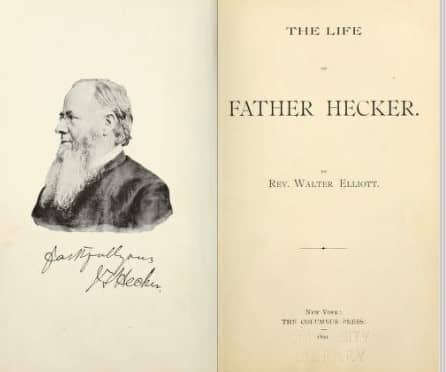April 10, 2017
Issue No. 18, April 2017
A Monthly Newsletter for Paulist Associates
The Associates World is the newsletter of the Paulist Associates. You can download a copy of this newsletter in PDF format (excellent for printing), or scroll down to read it in your Web browser.
- Appreciating Those in Senior Ministry Status
- Isaac Says…
- Forming Intentional Disciples — Associates in Chicago
- Book Review: Divided Friends— Written by William L. Portier
- Proposed Program for May
- Meet Our New Board Member
- Excerpt from “Communion with Jesus”
- A Good Friday Meditation
- Hecker’s Thought on Crucifixion and Truth
- St. Mary Magdalene at the Tomb
- Save the Date
- Prayer for the Intercession of Father Isaac T. Hecker
- Fr. Hecker Abstracts
- Contacts
- Promise
by Mary Burke — Associate from Boston
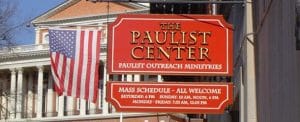
For Paulists, the next step, Senior Ministry Status (SMS), is a confirmation that being a Paulist is a way of life, not a job. Conversations with three of the men in senior ministry at the Paulist Center at Park Street in Boston — Fr. Bob Rivers, Fr Charlie Martin, and Fr. George Fitzgerald — illustrate this.
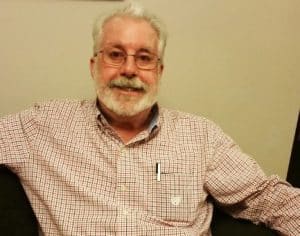
When the Center was fully staffed and Fr. Bob continued to recover, he focused his attention on evangelization setting up Paulist New England Evangelization Office with Fr. Paul Huesing. In addition, with a keen interest in Scripture and superb linguistic skills, he facilitated seven courses, following his close study of the Pauline Epistles. He has now turned to the Psalms.
More recently, he has been assisting at one of the archdiocesan parishes on weekends, and acting as a chaplain at a state high security prison once a month. At the Paulist Center, he helped establish the St. Dismas Committee to help meet some prisoner needs.
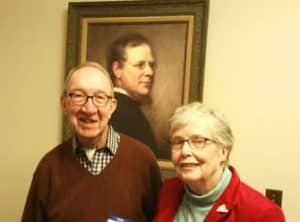
Fr. Charlie Martin route to SMS was more traditional. He lived at Park Street in the 1990’s. At that time, he was part of the Sunday liturgy rotation at the Paulist Center while working for the Archdiocese of Boston while also helping to care for his elderly mother. His last regular assignment was Superior at Vero Beach, the one retirement house the Paulists have. He wanted more time and less responsibility, and so returned to Boston in Senior Ministry a few years ago.
Until recently, he spent weekends assisting at a parish on the North Shore, but the hassle of commuting, especially in bad weather, led him to give this up.
Over the past few years, Fr. Charlie has worked with Fr. Tom Gibbons, serving as the narrator for the Isaac Hecker film documentary.
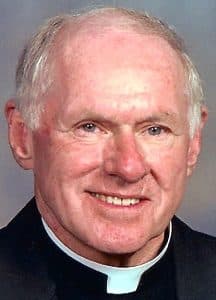
In our conversation, he mentioned that he faces the challenge common to many of us: “What next? How will I use the time I have meaningfully?”
Fr. George Fitzgerald has been at Park Street for about two years. He began Senior Ministry in San Francisco. Before relocation, he picked up all the weekend Masses every few weeks at a nearby parish.
Settling into Boston has been a challenge. He doesn’t drive, has yet to find a regular placement, and knows fewer people than he would like. Like Fr. Charlie, he very much enjoys his nieces and nephew and their families and now can see them more often. He keeps active by leaving town: he is invited to fill in for a month or longer at places where he’s served before and he’s always ready to go, especially if Boston is cold.
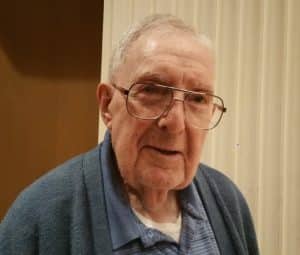
The Associates are a known presence to each of these priests and are seen as collaborators in the Paulist mission. Both the Associates and the local Paulists in Boston renew their Promises at the celebration of the feast of St. Paul. All the priests living at Park Street, including those in SMS, join the Associates for social gatherings. The future holds more opportunities for the Paulists in senior ministry to participate in monthly meetings where the Associates can listen to their stories and share their gifts. All will be enriched with this mutual interaction.
The sacraments are nothing else than channels, or visible means, of communicating the Holy Spirit to the soul. It is the divine action in the Church which gives to its external organization the principal reason for its existence.
And it is equally false, and at the same time absurd, to suppose for a moment that the Holy Spirit indwelling in the Church and embodied in her visible authority, and the same Holy Spirit dwelling in and inspiring the Christian souls, should ever contradict each other or come into collision.
— The Church and the Age, 1888
by Levita Anderson and Jacqueline Toepfer — Associates from Chicago
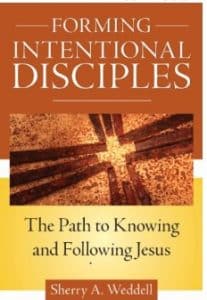
Each month we review and discuss the chapter that everyone has read with the questions that we answer from the study guide. We are learning about the importance of creating a more inclusive discipleship. But what exactly is this?
In our discussion on Chapter One, we looked at ourselves and our personal relationship with Jesus to see if we experienced the same cultural Catholicism that was described. It took us a while to understand the statistics and what it meant to be a “cultural” Catholic. By the end of the discussion, we began to grasp why some people leave the church — some because they were looking for a spiritual relationship that spoke to their personal needs. We also recognized that our church offers a spiritual and inviting relationship that meets the spiritual needs of our parish community. This type of relationship is what the author calls “intentional Catholicism:” meeting the spiritual needs of the people. We have that at Old St. Mary’s Church in Chicago — welcoming young and old, families with small children, to the spiritual teachings of Jesus.
On any given Sunday, you will find a host of Paulist Associates engaged in the typical liturgical ministries as a Eucharistic Minister, a Minister of the Word, Music Ministry, Hospitality Ministry, etc. While these are important expressions of discipleship, we know that discipleship is not an event … it is a lifelong commitment to Christ. And with that commitment comes a call to openly share the good news of Christ.
What is “normal” was the focus of our November meeting and proved to be very enlightening. In this conversation, we examined the three spiritual journeys — personal interior, ecclesial, and active practice. We all acknowledged that these are not separate but interrelated aspects of our spiritual journeys.
But for some of us cradle Catholics, this type of open sharing makes us a bit uncomfortable, or we may not understand how the sacraments and traditions that we love may appear as barriers to those on the outside looking in. Even the notion that we have been called to have “a personal relationship” with Jesus Christ may seem a bit foreign.
The ecclesial journey and our ecclesial vocation were at the heart of our January discussion, and we turned our attention to what our charisms are. Levita shared:
“When we listed teaching, missionary, and service as part of our ecclesial vocations, I then began to understand how my career as a teacher and volunteer in organizations like Girl Scouts and IEA-NEA [Illinois Education Association – National Education Association] have helped me in my ecclesial journey. Now I’m trying to see how this can help me be of service to my parish and my fellow Paulist Associates. Also, how this will help me be an intentional disciple of Jesus?”
While we have only just begun this discussion, the call to create a more inclusive style of discipleship, as presented by Ms. Waddell, is both clear and pressing. We have learned that many people who have left the Catholic Church, did so because they felt their spiritual needs were not being met, suggesting that a historic strategy of “get ‘em when they are young and they will continue to live the sacraments” is not meeting the needs of Catholic adults who are seeking a personal relationship with Christ.
This presents us with both a challenge and an opportunity — an opportunity because we know there are inactive Catholics who are seeking a deeper relationship with Christ; and a challenge because we need to discover a new, more inclusive style of discipleship that can draw ourselves and others into a fuller, more personal, experience with the living Christ. During the coming weeks, we will continue to discern what our gifts are and how can we use them to illuminate how to be more inclusive disciples as Catholics and as Paulist Associates.
If you would like to read some additional thoughts on this topic, check out “Can we think of discipleship in a more inclusive way?” by Father Francis P. DeSiano, CSP or pick up a copy of Sherry Weddell’s book and read along with us! Visit Our Sunday Visitor’s online store to order a copy of Forming Intentional Disciples.
By Michael Kallock, CSP – Paulist Associates Board Member
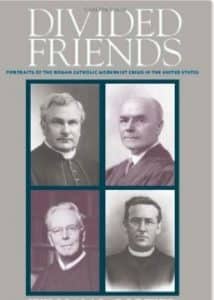
Divided Friends and his above-mentioned writings are challenging, scholarly works. They assume a decent background in theology and church history. They are not easy reads meant for a popular audience. They are, however a must for Paulist Associates who want to advance deep into the thought of Hecker, his times, and his relevance for us today.
Divided Friends is an in-depth portrait of two sets of friends and how they dealt with the “Modernist Crisis” that began in the church at the end of the 19th century. Simply put the Modernist Crisis was the Vatican’s reactionary fear of the developing modern world. It would have a chilling, suppressive effect on the emerging American Catholic Church.
Paraphrasing the back cover of the paperback edition, Divided Friends focuses on Bishop Denis J. O’Connell and Josephite founder John R. Slattery and Paulists William L. Sullivan and Joseph McSorley. (By the way, Slattery was an altar server at St. Paul the Apostle and Hecker prepared him for his first confession. He would have joined the Paulists but for his interest in the Negro Missions.)
Both Slattery and Sullivan would leave the Catholic faith over the Modernist Crisis and feel their friends O’Connell and McSorley were dishonest in remaining in the church.
What is particularly relevant and uplifting for us is that Portier emphasizes how Paulist Joseph McSorley found a spiritual way to move through the crisis without his losing his vision and hopes for future of the church; all the while McSorley maintained what Portier refers to as the “Hecker Tradition.” The section on McSorley, which covers about the last 70 pages, is well worth this challenging read. You might even want to race through the book till you get to this section on McSorley.
McSorley was a third-generation Paulist mentored by Water Elliott, who was mentored by Isaac Hecker. Elliott wrote The Life of Father Hecker, the work that was caught up in Modernist Controversy. (See this month’s “Fr. Hecker Abstracts” column about this book.)
McSorley submitted to the Oath against Modernism and basically remained silent about it for the rest of his long life. He, however, most importantly, kept the spirituality of Hecker alive in his pastoral life, especially as pastor at St. Paul the Apostle Parish in New York City. He would, for example, be Dorothy Day’s first and, in her own words, “best spiritual director.” After a long silence in 1952, McSorley published Isaac Hecker and His Friends. Chapter XI “Hecker’s Message,” is his subtle refutation of the church’s accusations that Hecker and the Paulists were “Modernists.”
McSorley died on July 3, 1963 at the age of 89. His life literally spanned the church’s suspicion of the modern world. Ironically, he died during Vatican II. It was only then that the church would opened the windows to the modern world and acknowledge the Holy Spirit at work in all religions, cultures, and peoples. Much of the ideas and spirituality that Hecker so zealously promoted and that McSorley kept close to his heart that the Modernist Crisis had suppressed had finally come home in the church.
Divided Friends: Portraits of the Roman Catholic Modernist Crisis in the United States by William L Portier, The Catholic University of American Press, 2013, 269 pp.
(This is a suggested format; each group may select another outline or topic.)
Theme: Called and Sent
Opening Prayer: The Paulist Prayer Book, select the Easter sections for the day on which you meet
Reading (in advance of the meeting):
This May we have many ways to think about our individual and collective vocations – from the post-Easter period of enlightenment of our catechumens, to the novena of preparation for Pentecost (on June 4 this year), to the ordinations of our brother Paulists as priests on May 20.
In this month, the Feast of the Ascension commemorates Jesus’ return to the Father, an absence which makes room for a presence, namely, the presence of the Holy Spirit in us, his body on earth. In his ascension, Jesus gets out of the way so that we might do the works that he did in his ministry, and “greater things than these.” (Cf. John 14:12)
The call of Easter and baptism always leads to the sending of Pentecost, and Isaac Hecker teaches us that “each individual has a special destiny, a definite work to do, and this work is great, an important divine work.” (“Divine Vocation to Life in Community, The Paulist Vocation, 117).
Pope Francis sounds like a Paulist in a homily from May 22, 2013, during the Pentecost novena:
“Evangelizing is the Church’s mission. It is not the mission of only a few, but it is mine, yours, and our mission. The apostle Paul exclaimed, ‘Woe to me if I do not preach the Gospel!’ (1 Cor 9:16). We must all be evangelizers, especially without lives! Paul VI stressed that ‘evangelizing is…the grace and vocation proper to the Church, her deepest identity. She exists in order to evangelize.’ (Evangelii nuntiandi, no. 14)
“We must all ask ourselves: How do I let myself be guided by the Holy Spirit in such a way that my life and my witness of faith are both unity and communion? Do I convey the word of reconciliation and of love, which is the Gospel, to the milieus in which I live? At times, it seems that we are repeating today what happened at Babel: division, the incapacity to understand one another, rivalry, envy, egoism. What do I do with my life? Do I create unity around me? Or do I cause division by gossip, criticism, or envy? What do I do? Let us think about this. Spreading the Gospel means that we are the first to proclaim and live the reconciliation, forgiveness, peace, unity, and love that the Holy Spirit gives us. Let us remember Jesus’ words: ‘it is by your love for one another that everyone will recognize you as my disciples, if you have love for one another’ (John 13:34-35).” (From Pope Francis, The Church of Mercy. Chicago: Loyola Press, 2014, 80-82)
Conversation Catalyst
- How are you being called in this time in your life to “convey the word of reconciliation and love” in your communities large and small, such as your family, your workplace, your social media presence, your neighborhood? How are you (y’all or youse, depending on your location) called as a community of Paulist Associates to a new or renewed work in your parish community?
- The idea of “mission” or “evangelization” is a foundation of our identity as Paulist Associates, as it is a foundation of the vision of Isaac Hecker. But “mission” or “evangelization” can have some negative connotations, because done poorly it can put up further road blocks between people and the Gospel. What are some better and worse ways of bringing the Gospel to others that you have experienced? How have those experiences shaped your identity as an evangelizer?
- Isaac Hecker wrote that “The best sermon on Christianity is a Christian.” (Hecker Diary, May 3, 1843; The Paulist Vocation, p.247) When have you experienced someone “preaching” through their lives? What did you learn about mission from that person?
- The Holy Spirit blows where She wills, and sometimes surprises us in providing gifts, strength, or a swift nudge in the backside to help us live out our calling. Are there any moments in your life where you felt the Holy Spirit calling you to do something new, challenging, or surprising to live out your baptismal vocation?
News/Announcements
Closing Prayer
This prayer is taken from the ordination rite of a Deacon, and is found in the Paulist Prayerbook on p. 419. I’ve changed the words “they” and “their” to “we” and “our,” so that as we pray, we can ask for a new outpouring of the Holy Spirit upon our Paulist ordinands to the priesthood this month, upon our new sister and brother Paulist Associates, and upon ourselves as one community of Paulists called and sent to bring Good News to our world.
Lord, send forth upon us the Holy Spirit,
that we may be strengthened
by the gift of your sevenfold grace
to carry out faithfully the work of the ministry.
May we excel in every virtue:
in love that is sincere,
in concern for the sick and the poor,
in unassuming authority,
in self-discipline,
and in holiness of life.
May our conduct exemplify your commandments
and lead your people to imitate our purity of life.
May we remain strong and steadfast in Christ,
giving to the world witness of a pure conscience.
May we in this life imitate your Son,
who came, not to be served but to serve,
and one day reign with him in heaven.
We ask this through our Lord Jesus Christ, your Son,
who lives and reigns with you and the Holy Spirit,
one God, for ever and ever. Amen.
[Thank you to Brian Flanagan, Associate originally from Boston and now a member of the Diaspora, for preparing this month’s proposed program.]

I have been married to Thomas Mertzlufft since 2008. Tom is also an Associate. Collectively we have 5 grown children spread around the US and 6 awesome grandchildren. We enjoy traveling to spend time with them, with our siblings and seeing as much of the world as we can.
After my retirement from a nursing career in the field of health and wellness, I became a spiritual director and currently have an active practice. It is a joy and a life giving experience that allows me to see God in the many stories of our lives and to witness the Presence and action of the Holy Spirit in our midst.
I look forward to serving on the Board to complete the terms of the vacancy and to share whatever gifts I can offer.
(No preacher is identified.)
John 6:57 — He that eats my flesh and drinks my blood abides in me, and I in him.
What was all that for? Why this sacrifice of the body and blood of Jesus Christ? Why should this be repeated all over the world? Lis ten once more: ” He that eateth My flesh and drinketh My blood abideth in Me, and I in him.” The reason was that his disciples and all others who should partake of that sacrifice might be united to Him in the closest manner possible ” should abide in Him, and He in them.” We call that sacred act “Communion,” communion with Jesus. That is what it is, brethren. Our souls and bodies are united in a mysterious man ner to the Divine Person of our dear Lord and Saviour, who became man and died on the cross for our salvation. He calls us to this communion, and gives Himself to us as the sweetest pledge of His Divine Love, as the most precious means of our sanctification, as a comforting food, as a holy offering by which we may praise and give thanks to God, as a feast of joy and the kiss of peace to the forgiven sinner.
If the Cross be, as it is, the measure of sin by which we offend Jesus, Communion is the measure of the love with which Jesus loves us. Love is measured by sacrifice. One loves another only a little if he is content to give up only a little in the other’s favor. His love is perfect if he willingly gives up all. This is what our Lord does in Holy Communion. He sacrifices all for us, because He sacrifices Himself. What do I mean by this sacrifice?
He makes Himself so utterly nothing for us, that He does not keep even His appearance. He hides His divinity, His blessed and beautiful Person, under the veils of bread and wine, and in that state He abandons Himself so utterly to our power that we can do what we will with Him. The life of Jesus in the Blessed Sacrament is a life of total self-abnegation. He does not even protect Himself from ill-treatment, from the con tempt and scoffing sneer of the unbeliever, from the mockery of silly children, nor from the horrible sacrileges committed against Him by bad Catholics. He can suffer all that, and docs so without a murmur, in order that He may approach us, and that we may receive Him in such a manner as shall be the best for our comfort, for our joy, for our soul s peace. We know by experience, I hope, what a good, happy communion is. Is it not the moment of supreme happiness, and of such happiness that nothing else is like it in the world? Then we cry Lord, now that Thou art mine and I am Thine, I am all blessed. There is no chord in the heart that does not vibrate with thrills of love at the presence of Jesus. He makes us feel then, more than we can express, how much He loves us; and cold must be the heart that does not respond with some emotion to the sweetness of His loving embrace.
The love of our dear Saviour for men [and women] is more ardent, more constant, more, shall I say, anxious than our love can ever be; and the reason is, because His love is wholly unselfish. The life of Jesus in the Blessed Sacrament proves it. He does nothing there apparently for Himself, nor takes any thought of Himself that we can divine. It is for us that He lives so. For our love He has given up all.
You may say that it was by dying for us that He proved His love the best, as He Himself said, ” Greater love hath no man than that he should lay down his life for his friend.” Yes; but do you not see that it is just in the Blessed Sacrament that He brings that proof home to us? It is a memorial of His passion and death. He has linked the two together, so that they make only one act. The sacrifice of the Mass, in which the bread and wine are consecrated into His body and blood, and the sacrifice of Calvary, are one essential act.

A poem by Frank Desiderio, CSP
How many ironies in that kiss
handing over his
friend to the religious cops?
Perhaps,
he saw himself in the
true mirror of Christ
and had to smash it.
O God,
give me the virtues
I think I have,
before I betray someone.
While he was still speaking, Judas, one of the twelve, arrived; with him was a large crowd with swords and clubs, from the chief priests and the elders of the people. Now the betrayer had given them a sign, saying, “The one I will kiss is the man; arrest him.” At once he came up to Jesus and said, “Greetings, Rabbi!” and kissed him. Jesus said to him, “Friend, do what you are here to do.” Then they came and laid hands on Jesus and arrested him.
— Matthew 26: 47-50
One of the pre-eminent marks of a true follower of Christ is the love of Truth above all things. Who have loved more deeply, or made greater sacrifices for Truth than the children of His Church? What is the meaning of the blood of the martyrs, the labors of her missionaries, the toil of her doctors and teachers throughout all ages, unless it be the supreme love of Truth? None have made, none are so willing to make, and none even in our day do make, so great sacrifices for Truth as her children. What else does the death on the Cross testify than the supreme and undying love of the Crucified for the Truth?
— from “On the Mission of New Religious Communities,” 1876; found in The Paulist Vocation
Easter Sequence (Victimae Paschali Laudes)
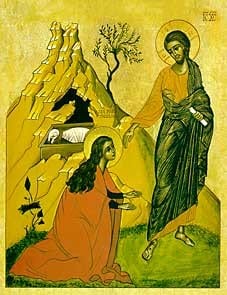
Offer your thankful praises!
A Lamb the sheep redeems;
Christ, who only is sinless,
Reconciles sinners to the Father.
Death and life have contended in that combat stupendous:
The Prince of life, who died, reigns immortal.
Speak, Mary, declaring
What you saw, wayfaring.
“The tomb of Christ, who is living,
The glory of Jesus’ resurrection;
bright angels attesting,
The shroud and napkin resting.
Yes, Christ my hope is arisen;
to Galilee he goes before you.”
Christ indeed from death is risen, our new life obtaining.
Have mercy, victor King, ever reigning!
Amen. Alleluia.
Central Texas Area (Austin and Horseshoe Bay) Retreat
Saturday, April 22, 2017
If any Paulist Associates would like to attend this one day retreat, please contact Kathleen Lossau at [email protected] for info on location and time.
Ordination to the Priesthood —Matt Berrios, Steve Petroff, and Stuart Wilson-Smith
Church of St. Paul the Apostle, New York, NY — Saturday, May 20, 2017
The Paulists have reserved blocks of rooms. The most inexpensive rooms are at the Bishop Malloy retreat house in Jamaica, a section of Queens, NY. It’s a long subway ride from the church at 59th street. Single occupancy with a shared bath. There are also two hotels in mid-town Manhattan, close to the church. Register on the Church of St. Paul the Apostle website.
The Spirit and Creativity: A Retreat for Paulist Associates in 2017
St. Mary’s on the Lake, Lake George, NY — Sunday, July 2 to Friday, July 7, 2017
The Holy Spirit was present at creation and continues as the Spirit of creativity. Explore your relationship with the Holy Spirit and your creativity at one of God’s most beautiful corners of creation.
Led by Fr. Frank Desiderio, CSP, Fr, Tom Gibbons, CSP, Fr. Vinny McKiernan, CSP, and Fr. Frank Sabatté, CSP.
See paulist.org/summerretreat2017
Baltic Sea Cruise and St. Petersburg, Russia— July 21 to August 1, 2017
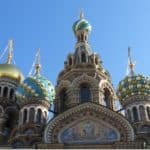
Sailing on the MS Vision of the Seas, the Baltic cruise will begin in Amsterdam, visiting many major capitals along the way with ports of call in Berlin (Warnemunde), Germany, Tallinn, Estonia; St. Petersburg, Russia; Helsinki, Finland; Stockholm, Sweden; and Copenhagen, Denmark. The highlight of the cruise will be two days in St. Petersburg, visiting Peterhof, the Grand Palace, the Hermitage, Catherine’s Palace, the Church of the Savior on Blood, Peter and Paul Fortress, and a hydrofoil boat ride. A special Russian lunch will be served each day, and Russian visas are included in this all-inclusive special pilgrimage journey. During the cruise, there will be two Sunday Liturgies on the ship.
For itinerary and registration form, see paulist.org/pilgrimages. For more information contact: Thomas A. Kane, CSP at [email protected].
A Kingdom of Unlikely Followers: A Paulist Retreat with Fr. Steven Bell, CSP, Fr. John Collins, CSP, and Fr. Tom Gibbons, CSP
Marble Falls, TX — November 11-12, 2017
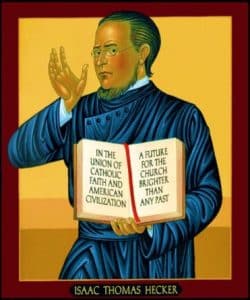
Look upon us this day, with compassion and hope. Hear our prayer. We ask that through the intercession of Father Hecker your servant, you might grant us (state the request).
We ask this in the name of Jesus Christ, Your Son, Our Lord, who lives and reigns with You and the Holy Spirit. One God, forever and ever. Amen.
When you pray this prayer, and if you believe that you have received any favors through Hecker’s intercession, please contact the Office of the Cause for Canonization of Servant of God, Isaac Hecker at [email protected]. Visit the web site: isaachecker.org to learn more about his life and the cause for his canonization.
Some Associates are looking for additional resources for a more in-depth reflection on the life and works of Servant of God and founder of the Paulists, Isaac Hecker. For the next several months, we will feature a book, article, web site, or other resource to consider for further study by individuals and perhaps by the local groups.
Your recommendations are welcome. Please send your suggestions to Paula Cuozzo at [email protected].
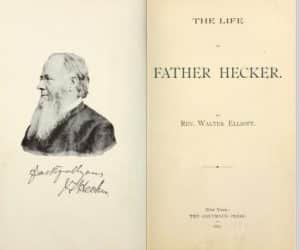
by Walter Elliott, CSP
Walter Elliott was devoted to Isaac Hecker and published this first official and comprehensive biography of Hecker in 1891.
He wrote in the Introduction: “… I cannot help saying, that I have felt the joy of a son in telling the achievements and chronicling the virtues of Father Hecker. I loved him with the sacred fire of holy kinship, and love him still …”
Although he wrote this book with greatest respect for Hecker and the Catholic Church in America, in the French translation’s introduction, Fr. Felix Klein stated that Hecker promoted “Americanism.” In response to Klein’s assertions, in 1899 Pope Leo XIII sent a letter, Testem Benevolentiae, to James Cardinal Gibbons, the leading US Catholic bishop, who, in turn, assured the Pope that such a heresy was not embodied in the Church in America.
Despite this controversy, this is an important work by a first person witness of Hecker’s work and life.
This work is available for free download at archive.org.
Paulist Associates National Director
Frank Desiderio, CSP
Paulist General Office
New York, NY 10023
Board Members
Angie Barbieri
Toronto, ON, Canada
Paula Cuozzo
Boston, MA
Cathy Hoekstra
Grand Rapids, MI
Mike Kallock, CSP
Katherine Murphy Mertzlufft
Columbus, OH
Joe Scott, CSP
I believe that I am drawn by the Holy Spirit to the spirituality and qualities of the Paulist Community. I have discerned both by prayer and study that God calls me to become associated with the Paulists. I promise that I will pray for the works of the Paulist Society, meet with others, who are also members of the Paulist Associates, for spiritual sharing and formation; and I seek to embody the apostolic qualities of the Paulists in my daily life.
Attentive to the Holy Spirit and faithful to the example of St. Paul and the charism of Father Isaac Hecker, I commit myself for one year of membership in the Paulist Associates.
